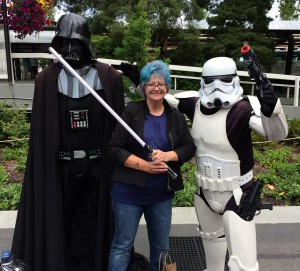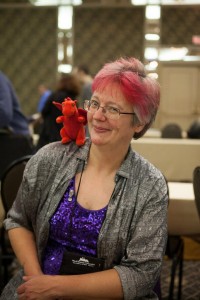
It all started innocently enough about five or so years ago. A fellow author sent me a link to an article about the Book View Café, and we figured: why don’t we do something like this? By this stage many of us in our small circle of writerly folks were already rather jaded about the opportunities available in the industry””especially for those of us who live in far-flung places like South Africa where there isn’t a big market for SFF fiction. Some of us had already been agented, had sold novels to big publishing houses. Some of us were not making it out of the slush pile yet”¦ or were exhausted by all those full requests for submissions that simply vanished into a sticky silence. Added to that, some of us also had had unpleasant experiences with small presses going under, taking their back catalogue out of print. And a good handful were simply daunted by the war stories told by their author friends who’d already had a mad whirl on the merry-go-round of getting published and had their fingers burnt.
When we put our heads together, we realised that within our core group, we possessed all the skills and experience already garnered in the publishing industry so that if we helped each other, we could do the same, if not better, than a publishing company.
But then why not set up our own small press?
I can give you one word for that: Freedom.
Instead we envisioned a co-operative, very similar to the one described in the Book View Café post, and Skolion came into being.
Our vision for our co-operative is underpinned by that one small word: freedom. Anyone who’s had a book stuck in a bad contract will understand why that one little word is so important to authors who’ve had a raw deal. We desired a situation where authors wanting to go their separate ways did not have to untangle their titles from a contract. We are a small group that works on a handshake, so it goes without saying that mutual trust is also highly valued.
So, how do we make it work?
While the group is a voluntary association, three of us have agreed to take on management positions in terms of editing, administration, and marketing. We are also looking into setting up as a non-profit organisation at some point in the future, and to that end, we’ve gone as far as drawing up a constitution for our co-operative that sets out clear goals and how we operate. While we aim to be flexible, we also believe in clearly defining how our processes work. This helps to keep us on track.

The emphasis of our work as a co-operative is on quality, not quantity. These days, there’s an alarming trend of indie authors putting out a book a month. This often results in the minimum viable product falling into the hands of readers. And readers aren’t idiots. They know all too well when they hold an inferior product in their hands. We aim to avoid that. We recognise that a good book is a work of art that may require more than one set of hands and eyes to help shape it. And time. From within Skolion, we help each other by assessing each other’s work with care and diligence. We are attentive readers who love our chosen genres and know what to look for in terms of story-craft. Thereafter, a story will enter however many editing rounds as needed before it goes through to layout and formatting. And of course, the all-important proofing takes place as well.
We place emphasis that power lies primarily within the authors’ hands themselves. They get to make important decisions about how and when they want to publish, how they wish to set their prices. As a team, we stand behind them, help amplify their social media reach, provide encouragement and support. It’s a win-win situation.
But what about co-operative vs. traditional publishing?
So, the question people sometimes ask, are publishers even necessary in this day and age? The answer is simple: of course! Depending on the publisher, they can offer authors much in terms of reach, expertise, and marketing. Big publishers will have many resources upon which they can draw, be it an existing footprint in terms of marketing, access to professional editors, and of course print distribution (this last being where indie publishing often can’t compete.) Depending on the project, the right publisher will absolutely be the right option for an author. But these days, with many publishers being averse to risk-taking, it’s also safe to say that not all projects are suitable for a particular publisher. Hence the reason that many authors are embarking on hybrid careers that span the range of traditional and small press to self- or co-operative publishing. And it’s the latter that I believe marries up the best of both worlds when it comes to traditional and self-publishing. Skolion supports its authors when they have books that won’t quite suit the traditional publishing model.
Where to start, though? How can you set up your own co-operative?
A few years back I encountered an interview with a well-known film director who talked about collaboration, and about “˜making it’ in a tough industry. I also believe his advice is applicable to other creative industries. Now I’m going to paraphrase horribly, because for the life of me I can’t track down that particular interview. The basics were that authors should not glomp onto people who’re further up the feeding chain than they are. Don’t ride others’ coattails, in other words. Often enough, these luminaries in your chosen field already have their network set up, the people they’ve grown accustomed to working with on projects. And they’ll be busy. They’ll have many obligations. I can guarantee that.
I’m going to be brutally honest here. The chances of one of these public figures noticing you long enough to either give you a shout out that will have tangible impact on your career or even to give you a hand up are slim to none. These folks are where they are because they’ve worked hard, as should you. Now I’m no Neil Gaiman, I’m a freelancer, and I’ve got zero time to read someone’s story just to give an opinion. (And neither can Neil, I’m sure.) Unless you pay me. Then we can talk.
Instead of hanging onto your favourite celeb author hoping for morsels, create a network of authors and creatives who are in a similar space where you are. Sure, some may have a novel or two out already. Or a novel being submitted. Or even have a few they’ve self-published. The trick is to help each other, to create a semi-closed network of authors and creatives who are willing to help each other. And, most importantly, a close circle of authors who trust each other. This last is a vital ingredient in making a voluntary association of authors work well.
How does Skolion handle the publishing process?
At first, we spend time beta reading and proofing for each other, and we maintain a list of the various skills folks have to offer. Various members can handle tasks such as layout, design or formatting, and if for some reason we need to outsource, we have a list of preferred professionals. We constantly pick up tips from our fellow indie authors to find out who they’ve worked with in the past and use people who have a good reputation in our chosen genres and who understand what we need.
We also set up a schedule and decide between ourselves on a realistic publishing timeline. This way we prevent books from releasing in clumps. We assign tasks to people, such as beta reading, editing passes, layout and formatting, as well as coordinating any marketing initiatives to help promote new and existing releases. With any outsourced work, we’ve found it best if the author herself pays for any work that needs to be done, be it commissioning illustrations or cover design. As far as possible, we split any costs that might come up to be as fair as possible. These could be related to hosting a website, paying for the design and printing of pull-up banners or booking a table at a convention. If any issues come up, our committee will discuss the best course of action and then inform other members of the co-op, in order to find a solution that will fairly accommodate everyone.
Perhaps the most important qualities we’ve discovered are patience, teamwork, and a willingness to play the long game without egos getting in the way. We understand that in this game of making books, we are in the process of breathing life into people’s dreams. After all, it was other people’s dreams made concrete in the books and films we adore that brought us this far.
The Skolion authors’ co-operative has been active since 2016, and for us it’s the journey that matters. Our authors include myself, Amy Lee Burgess, Cat Hellisen, Cristy Zinn, Carrie Clevenger, Icy Sedgwick, Jenny Rainville, Laurie Janey, Masha du Toit, Stacey Reilander, Suzanne van Rooyen, Tallulah Lucy, Toby Bennett and Yolandie Horak. Since working within the co-operative, many of our authors have gone on to win literary awards, or at least make long- and shortlists. For us it’s about having that all-important buddy system that helps us ensure that our work is the best that it can be. Find out more about us at www.skolion.org
 BIO:Â Nerine Dorman is a South African author and editor of science fiction and fantasy currently living in Cape Town. Her novel Sing down the Stars won Gold for the Sanlam Prize for Youth Literature in 2019, and her YA fantasy novel Dragon Forged was a finalist in 2017. Her short story “On the Other Side of the Sea” (Omenana, 2017) was shortlisted for a 2018 Nommo award, and her novella The Firebird won a Nommo for “Best Novella” during 2019. She is the curator of the South African Horrorfest Bloody Parchment event and short story competition and is a founding member of the SFF authors’ co-operative Skolion, that has assisted authors such as Masha du Toit, Suzanne van Rooyen, Cristy Zinn and Cat Hellisen, among others, in their publishing endeavours.
BIO:Â Nerine Dorman is a South African author and editor of science fiction and fantasy currently living in Cape Town. Her novel Sing down the Stars won Gold for the Sanlam Prize for Youth Literature in 2019, and her YA fantasy novel Dragon Forged was a finalist in 2017. Her short story “On the Other Side of the Sea” (Omenana, 2017) was shortlisted for a 2018 Nommo award, and her novella The Firebird won a Nommo for “Best Novella” during 2019. She is the curator of the South African Horrorfest Bloody Parchment event and short story competition and is a founding member of the SFF authors’ co-operative Skolion, that has assisted authors such as Masha du Toit, Suzanne van Rooyen, Cristy Zinn and Cat Hellisen, among others, in their publishing endeavours.
If you’re an author or other fantasy and science fiction creative, and want to do a guest blog post, please check out the guest blog post guidelines. Or if you’re looking for community from other F&SF writers, sign up for the Rambo Academy for Wayward Writers Critclub!
...

Here’s some stuff that’s come up:
One thing that is part of the confusion is that we have 2 entities, the SFWA Qualifying Markets list, where a publication is an auto-accept and then pretty much other markets that aren’t on that list but which meet the 6 cents a word requirement. Right now we’re looking at those on a case by case basis and trying to figure out good rules.
At the same time, crowd-funded source is eligible if it pays AND the book is delivered (because we thought that was important.) To get on the SFWA Qualifying Markets list, you must meet certain criteria, including having been around a while. On the other hand, you can qualify with a market that is not on the list, you just have to show us it’s legit.
Net versus gross: mainly we’re trying to weed anyone out who’s trying to buy their way in by spending a lot on the selfpub equivalent of a vanity press. We know there are problems with this approach; I personally hope it will be dispensed with, but that remains to be seen.
A single work: People have pointed out that for some people it’s about writing quantity, and wonder if the sales amount couldn’t be split between multiple books. It’s certainly worth discussing, but I dunno. I would need a little more convincing.
Somewhat predictably, many people think the dollar figure should be different although mileage varies as to which direction that goes in.
I’ve been watching some new members come in, and others re-join because they’re happy about this direction. I’d be among the first to apologize for it taking so long, but I will point out that we will look at crowdfunded money where other organizations, as far as I do, don’t yet.
I was thinking about doing a Google Hangout on Air to answer questions, is that something people might be interested in?
...

Income can come from crowdfunding, but in that case, the book must have been delivered to the funders in a timely fashion. You can combine advance and royalties, but they must fall in the same twelve months.
The income is net, not gross. If you spend ten thousand bucks printing books and then sell them for three thousand dollars, that would not count. Mainly this is there to keep people from faking their way in and I’m not too worried about small publishing expenses counting here, myself.
How do you prove income? Right now, we’ll look at whatever people think is reasonable. As the month progresses, we’ll start knowing what is and isn’t reasonable.
This is all very new, and I know we’ll be deciding many cases as we go along. I also expect there will be delays at first as we get the process working and people flowing through the pipeline.
You can find out more on the SFWA site. The application form is there. I apologize for the fact that it’s not entirely suited to self-pub apps so far – we’re working on that, and I’d be glad to hear your suggestions.
Got questions? I can answer them here if you like.
Note from a question that arose in this morning’s e-mail: Active members CAN qualify through self-published short fiction; that got left out of the official webpage and I’ve got a request in to add it.
...

Yep, I’m running for President, even though that’s a two year term. I’ve got a number of projects I want to see through, and this seems the best way to do it. The self-pub and small press qualifications amendment has passed, and I’d like to help SFWA adjust to that large change.
You’ve seen me in action as vice president for a year. I don’t know that it was the most representative year since I spent most of it on the road, but I think I’ve demonstrated that even when other stuff crops up, I do stick around. I had to put a couple of projects on the back burner while waiting for the selfpub/small press qualifiying vote to shake out but now that the vote has passed, I hope to pick up those loose ends. By now, I’m starting to get more of a handle for the internal workings of SFWA, and that should help me be even more effective.
I’ve fixed a few small problems, and I’ve got some other stuff in motion that will solve others. Some of that is fairly visible, such as the push to make it easier for volunteers to find roles within SFWA. Overall SFWA is still suffering some growing pains, and I’ve found my experience as management very helpful there.
Most of you that have worked with me know that I’ve got decent people skills and a solid work ethic. When it comes to the various factions that clash occasionally, I’ve got friends on most sides and pride myself on trying to listen and understand where people are coming from. I’ve tried to be good about touching base with other members of the SFWA team and working well with them, including weekly Google Hangout sessions and phone calls. I don’t mind admitting when I’m wrong, and I try to learn from both my mistakes and what other people pass along. Aside from deciding to run, I am reasonably sane.
...
Want access to a lively community of writers and readers, free writing classes, co-working sessions, special speakers, weekly writing games, random pictures and MORE for as little as $2? Check out Cat’s Patreon campaign.

"(On the writing F&SF workshop) Wanted to crow and say thanks: the first story I wrote after taking your class was my very first sale. Coincidence? nah….thanks so much."